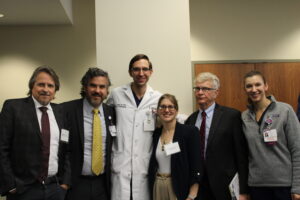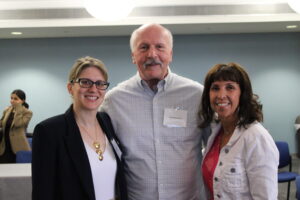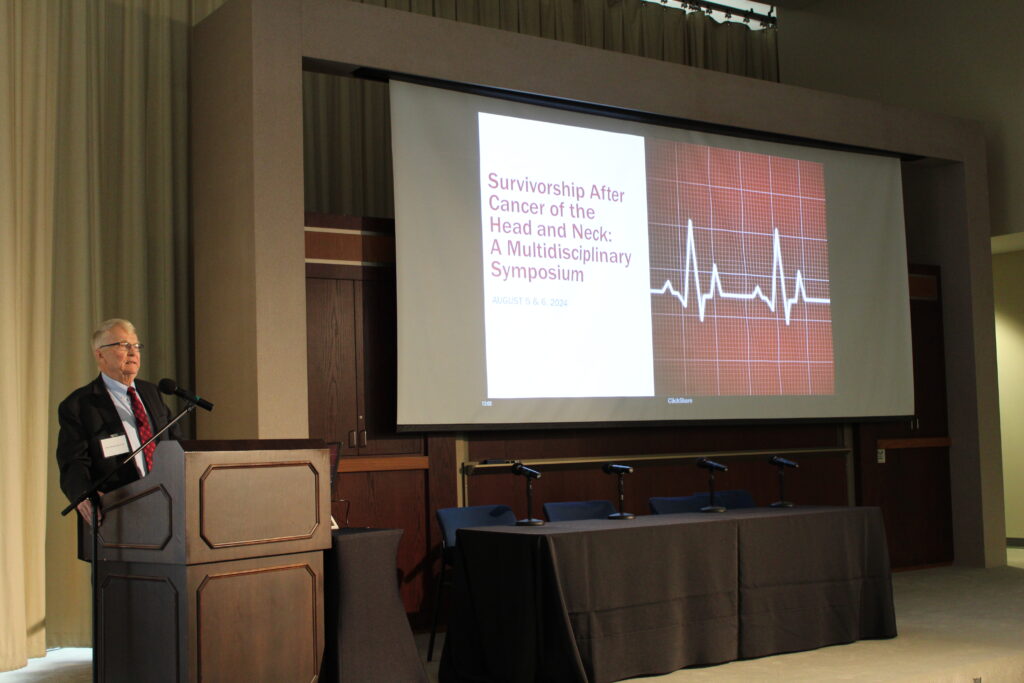The Survivorship Clinic hosted its sixth Survivorship After Cancer of the Head and Neck Multidisciplinary Symposium, with its best turnout yet.
“What [was] outstanding was the multidisciplinary aspect of it and the huge push for survivorship care for our patients that we really don’t do well as an entire cancer caring community,” said Tessa Goldsmith, a speech pathologist at Mass General Hospital at Mass Eye and Ear Boston.
Over the one-and-a-half-day symposium, experts from around the country spoke. Douglas Chepeha, MD, from Toronto, talked about functional outcomes. Carly Barbon, PhD, MA, from MD Anderson’s talk was titled, “Mind the Gap: Optimization of early post operative lingual function toward long term outcomes.” She focused on targeting patients between surgery and radiation; during this period work would be on more proactive prehabilitation strategies. Nosayaba (Nosa) Osazuwa-Peters, BDS, PhD, MPH, CHES, from Duke, discussed head and neck cancer (HNC) disparities.

Local speakers included Dr. Marci Nilsen, PhD, RN, FAAN, co-founder of the UPMC Head and Neck Cancer Survivorship Clinic with Dr. Jonas Johnson, MD, FACS, gave a keynote on advancing equitable and accessible survivorship care. Dr. Matthew Spector, MD, FACS, Division Chief, Head and Neck Surgical Oncology & Microvascular Reconstruction, spoke on the importance of donor site selection to predict outcomes in head and neck reconstruction.
Other presentations included after cancer rehabilitation, psychological needs and well-being of head and neck cancer survivors, and social support for survivors. Poster contests also highlighted emerging research.
Monica Wagner, PhD, RN, at Case Western Reserve University took first place for her poster entitled, “Sociodemographic, Clinical, and Biological Factors that Influence Radiation-induced Fibrosis in Head and Neck Cancer Survivors.” Lisa McIlvried, PhD, came in second with her poster entitled, “Intratumoral Sensory and Sympathetic Nerves Modulate Pain in Head and Neck Cancer.” Lori Zitelli, MA, AuD, Managing Audiologist, UPMC Audiology, took third place for “Hearing screening and amplifier uptake results in a multidisciplinary head and neck cancer survivorship clinic.”

Local resources like Cancer Bridges and Let’s Talk, a laryngectomy support group run by Rich Boguszewski, were also present to talk about what their groups have to offer. Social worker Wendy Myers from Cancer Bridges said, “Sometimes it’s hard to find new knowledge, but there’s a ton of new knowledge that I learned that I’ll take back to my organization to help our members and their families that support them. I wish that all cancers had a survivorship program that head and neck has at UPMC.”
Dr. Johnson, Emeritus Distinguished Service Professor and Chairman, Department of Otolaryngology-Head and Neck Surgery, said that the team is committed to patient care and study to better understand the challenges faced by head and neck cancer survivors and their families.
“We hold this annual symposium to help the community of providers engaged in this field better understand the needs of our patients and to promote discussion about “Best Practice,” he said.
In addition to holding this annual symposium, the team participates in meetings about head and neck oncology in the U.S. and around the world. Their data has been the basis of over 40 publications.
The next symposium on Survivorship After Head and Neck Cancer is August 4-5, 2025.
